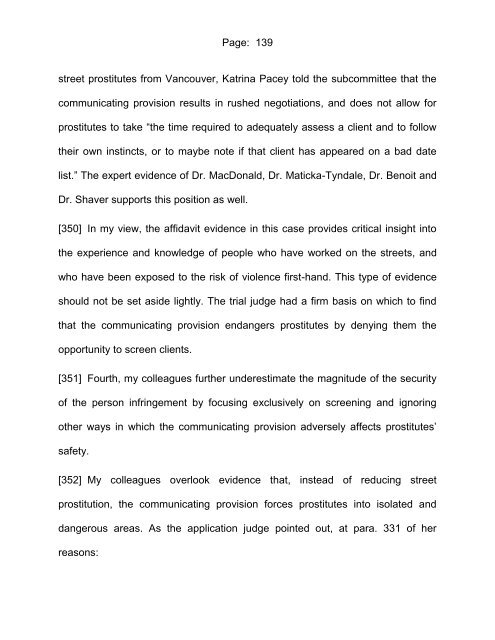- Page 1 and 2:
BETWEENCOURT OF APPEAL FOR ONTARIOC
- Page 3 and 4:
Page: 3ContentsBACKGROUND .........
- Page 5 and 6:
Page: 5(3) Is the living on the ava
- Page 7 and 8:
Page: 7principles of fundamental ju
- Page 9 and 10:
Page: 9BACKGROUNDThe parties[10] Te
- Page 11 and 12:
Page: 11212. (1) Every one who…(j
- Page 13 and 14:
Page: 13makes it illegal for a pros
- Page 15 and 16:
Page: 15cross-examination on some o
- Page 17 and 18:
Page: 17the definition of “common
- Page 19 and 20:
Page: 19In conclusion, these three
- Page 21 and 22:
Page: 21[40] Turning to the ban on
- Page 23 and 24:
Page: 23THE GOVERNMENTS’ APPEAL[4
- Page 25 and 26:
Page: 25application judge and now p
- Page 27 and 28:
Page: 27found that the liberty infr
- Page 29:
Page: 29analyses that have applicat
- Page 32:
Page: 32Section 2(b): What did the
- Page 35 and 36:
Page: 35[79] Clearly, Swinton J. di
- Page 37 and 38:
Page: 37right to expect that they m
- Page 39 and 40:
Page: 39crime-creating legislation
- Page 41 and 42:
Page: 41Siemens v. Manitoba (Attorn
- Page 43 and 44:
Page: 43fundamental component of pe
- Page 45 and 46:
Page: 45steps that could reduce the
- Page 47 and 48:
Page: 47interest.The appellants mai
- Page 49 and 50:
Page: 49[110] We examine the releva
- Page 51 and 52:
Page: 51[114] We find support for o
- Page 53 and 54:
Page: 53application judge, many pro
- Page 55 and 56:
Page: 55in which, the respondents c
- Page 57 and 58:
Page: 57findings of fact. The chara
- Page 59 and 60:
Page: 59arbitrariness, overbreadth
- Page 61 and 62:
Page: 61parties, she did not engage
- Page 63 and 64:
Page: 6360.2(f); R. v. Sharpe, 2001
- Page 65 and 66:
Page: 65inconsistency, or a more ex
- Page 67 and 68:
Page: 67[152] The appellants seize
- Page 69 and 70:
Page: 69[158] The appellants frame
- Page 71 and 72:
Page: 71sufficient to establish ind
- Page 73 and 74:
Page: 73[169] To conclude on this p
- Page 75 and 76:
Page: 75[175] Bawdy-houses were ini
- Page 77 and 78:
Page: 77[181] The phrase relied upo
- Page 79 and 80:
Page: 79Viewed in historical perspe
- Page 81 and 82:
Page: 81real connection to the obje
- Page 83 and 84:
Page: 83However, we have concluded
- Page 85 and 86:
Page: 85[206] Given the importance
- Page 87 and 88: Page: 87many vulnerabilities, stree
- Page 89 and 90: Page: 89declaration of invalidity o
- Page 91 and 92: Page: 91case law that has interpret
- Page 93 and 94: Page: 93[226] The first device was
- Page 95 and 96: Page: 95(c) The Barrow restriction[
- Page 97 and 98: Page: 97(2) Objective of the living
- Page 99 and 100: Page: 99[242] The fact that the eff
- Page 101 and 102: Page: 101[247] The case for a blank
- Page 103 and 104: Page: 103(5) Is the living on the a
- Page 105 and 106: Page: 105From a review of Committee
- Page 107 and 108: Page: 107Carol Rogerson in "The Jud
- Page 109 and 110: Page: 109s. 212(1)(j) by reading in
- Page 111 and 112: Page: 111company of, a prostitute i
- Page 113 and 114: Page: 113[282] At para. 277 of her
- Page 115 and 116: Page: 115and core societal values,
- Page 117 and 118: Page: 117unwelcome solicitation of
- Page 119 and 120: Page: 119[295] Weighing these facto
- Page 121 and 122: Page: 121context, those expressions
- Page 123 and 124: Page: 123[307] While street prostit
- Page 125 and 126: Page: 125application judge relied o
- Page 127 and 128: Page: 127comparable to the impact o
- Page 129 and 130: Page: 129exacerbate the claimant‟
- Page 131 and 132: Page: 131CONCLUSION[325] For the re
- Page 133 and 134: Page: 133MacPherson J.A. (Dissentin
- Page 135 and 136: Page: 135provisions are. To illustr
- Page 137: Page: 137[344] The point I draw fro
- Page 141 and 142: Page: 141and afraid to report abuse
- Page 143 and 144: Page: 143the violence faced by stre
- Page 145 and 146: Page: 145these provisions was start
- Page 147 and 148: Page: 147their efforts to work coll
















